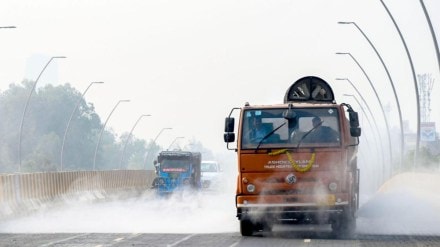The winter season in Pune has arrived with an unwelcome companion of air pollution. While the air quality in the city is not as toxic as that of Delhi-NCR but over the past two weeks, a rapid slide in their Air Quality Index (AQI) levels — from ‘Satisfactory’ to ‘Poor’ — has been noticed by local authorities and Central Pollution Control Board (CPCB).
At the start of November, residents were breathing relatively easy. AQI readings in Pune ranged between ‘Good’ and ‘Satisfactory’, with the city recording an AQI of 56 on November 1. But by November 15-16, the numbers had climbed alarmingly. Pune’s AQI shot up to 162.
Data from the Central Pollution Control Board (CPCB) confirmed the steep deterioration in several parts of the city. The decline is primarily being driven by PM10 in Pune Municipal Corporation (PMC) limits. These fine particulate matters, known to penetrate deep into the lungs, are among the most dangerous forms of pollution.
Residents feel the impact of poor air
For residents, the impact is already being felt. Health complaints, ranging from breathing difficulties to itchy skin, burning eyes, increased respiratory infections and even children missing school, have surged of late. Bhavreen Kandhari, co-founder of Warrior Moms, a nationwide movement of mothers advocating for clean air, told The Indian Express that the situation is eerily reminiscent of Delhi’s pollution crisis.
Kandhari recalled that families, including hers, once migrated from Delhi and Gurugram to Pune hoping for clean air but the city is also heading towards a toxic air crisis. Kandhari, who has two daughters, said she restricted their outdoor playtime during her time in Delhi. “The health risks were too high in Delhi, but in Pune too our mothers have been actively advocating for every child’s right to breathe clean air through awareness campaigns, community workshops and public installations such as their ‘white lungs’ display,” she told IE.
Dipping AQI leads to surge in sale of medicines
The growing anxiety of air pollution is also backed by research. A study by the Prayas Health Group in Pune examined the link between daily air quality and the sale of medications used in nebulizers to treat acute respiratory symptoms. The findings were stark. Fellow with Prayas Health Group, Ritu Parchure, told IE, “For every 10 µg/m3 increase in PM2.5 level, there was around 6-8 % jump in medicine sales. This jump was seen even when the PM2.5 level was below 50 µg/m³. These studies give out a clear message. To prevent the health harms associated with air pollution, the city’s air quality must remain “Good” at all times. Action must begin early and be sustained over the long term.”
Parchure warned that air pollution is not limited to breathing issues. “Air pollution is a multisystem threat. Air pollution doesn’t just harm the lungs, but a large number of cardiovascular ailments—including heart attacks and strokes—are also attributed to it,” she added.
Neurologist Dr Joy Dev Mukherji told ANI that research has identified a statistical connection between air pollution and dementia. While the precise biological mechanism remains unclear, he said the likely explanation is inflammation in the brain, which over time can cause damage to nerve cells.
Experts have been stressing that both immediate and long-term strategies are essential in order to tackle air pollution. Pune, once seen as cleaner alternatives to megacities like Delhi, now faces a turning point that demands policy intervention, citizen awareness and sustained monitoring to ensure safe air quality.
